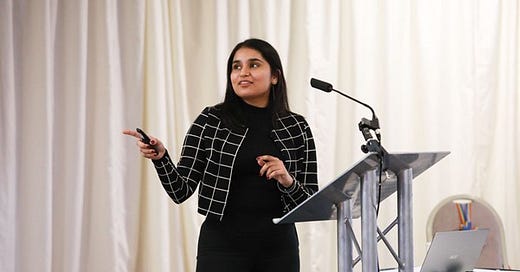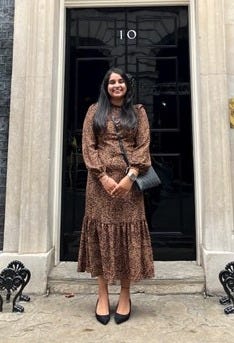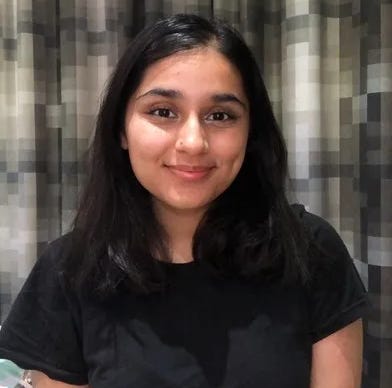Mental Health Champion: An interview with Tanya Marwaha
How does a teenager masking anxiety and depression, living with chronic pain and undiagnosed ADHD, challenge social stigma to become a mental health champion?
(Trigger Warning: depression, anxiety and suicidal thoughts)
Tanya Marwaha was once a vulnerable teenager, hiding her anxiety and depression while managing an undiagnosed chronic fatigue syndrome. Rather than bring shame on her extended family by seeking help, she secretly wrestled with her mental health. Concealing her symptoms, confused and embarrassed, she attempted to fit into the role expected in her traditional South-Asian family. Eventually, isolated and misunderstood, she lost the will to carry on.
Over time, Tanya found her inner-courage to challenge the world around her to become the mental health, disability and suicide prevention speaker she is today. In her early twenties, she balanced a competitive corporate career with her mental health advocacy work. When she was diagnosed with ADHD as an adult, it allowed her to view her challenges with more compassion and understanding. In this interview she shines a light on her experiences as a South-Asian growing up with mental and physical health challenges.
How did your mental and physical health challenges impact your teenage years?
Growing up in a South-Asian household, in a small town in the south of England, my experiences and understanding of mental health was limited. I had a very traditional upbringing and at home there was no Western media. We watched soap operas from India, deferred to rituals and religion, and central to my life was fulfilling the expectations of my community.
When I started to have feelings of anxiety and depression, I didn’t share them with anyone. In my mind, I pictured the characters from Indian TV shows who were stigmatised by their families, seen as ‘mad’ and sent to asylums. Afraid I would be treated the same way, I felt ashamed and became even more isolated.
I masked my true thoughts and acted out the role of a happy daughter, but I couldn’t keep up the act and my family noticed. They consulted our family priest in India who recommended rituals to help. For years, I slept with a shoe next to my pillow and kept a glass of water under my bed to be emptied in the garden each morning.
In public, I carried on masking my struggles so I wouldn’t bring shame on the family. Around the same time, I started feeling fatigued. Not just ‘tired’, but exhausted. I spent my teenage years going back and forth between doctors. It wasn’t until adulthood that I was diagnosed with a chronic fatigue and pain illness, which means I am registered disabled.
How did your perspective on your challenges change?
I became frustrated, disillusioned with the lack of understanding, and I wanted to understand my issues for myself. Once I was diagnosed with anxiety and depression, I joined online communities set up by those with similar challenges. They became my virtual sanctuaries, a place I didn’t need to justify or explain my existence. I began to question the shame I felt, realising that silence only feeds ignorance. If my community’s perceptions were to change, I needed to start the conversation and not be afraid to share.
I was inspired to write a blog, sharing my struggles and triumphs with friends and family. It felt terrifying to be so vulnerable, but I also felt liberated. I really didn’t expect the overwhelmingly positive response.
Each positive interaction felt empowering, another step towards taking back control of the narrative I had been fed as a child. I realised that my words possess the power to create change.
We all mask to some extent, but it can quickly become overwhelming. How did it manifest in your life?
My community placed expectations on me from a young age, from my educational achievements to my behaviour. Growing up, I saw female role models around me masking their true thoughts and emotions, modifying their behaving to fit the cultural norms of our society. The habit of masking was so ingrained that I couldn’t tell when I truly felt something or if I was still pretending. It took time to unlearn this behaviour, so that I could authentically communicate with my family and with the world.
Once I started to question the way my mental health challenges had been managed, by following superstitious rituals in secret rather than seeking the help of a medical professional, I challenged this. This was incredibly difficult as the pressure to conform was immense and I sometimes felt as if I was gaslighting myself – questioning my own beliefs and actions. It was a turbulent time for me, there was so much internal conflict.
What happened with your family when you challenged their approach to mental health issues?
Some family members were incredibly supportive, like my parents and siblings, and they wanted to learn about how to change. But some members of my community struggle with the public way I speak about mental health and disability.
I’ve come to see this discomfort as a positive force which has driven my personal growth and development. Challenging societal norms has been an essential step in my journey.
I’ve now unlearnt the narrative that vulnerability is synonymous with weakness, and I want to spread this message to others.
Vulnerability is not the same as weakness
How do you navigate the crossroads between identity, culture, expectation and dreams?
One of the most important lessons I’ve learnt is to redefine my understanding of strength and weakness, particularly when it comes to physical and mental health challenges. Once, I viewed these struggles as signs of weakness but now I see them as opportunities and blessings in disguise.
I’ve had to draw on a depth of resilience I didn’t know I had and this has has helped me to continue speaking my truth, even when faced with stigma from my community. I now rely less on external validation and I try to meet my internal needs by myself.
I can’t underestimate the positive impact from surrounding myself with like-minded people who share similar values and experiences. This shift, towards receiving acceptance and understanding in my social circles, has encouraged me to share my story more widely.
How has chronic fatigue and pain impacted you?
For me, the tiredness and the pain appeared suddenly when I was twelve. I can’t remember what life felt like before it took hold. When it first started, I was in a perpetual cycle of pain and exhaustion but had no idea why. It took seven years to get a diagnosis. During that time, it was difficult for my friends and family to understand how I felt as I didn’t have any outward signs. This is probably one of the reasons I relied on masking as it made it easier for everyone else to believe I felt fine.
The world that I live in isn’t built to take account of disability, particularly when it is an invisible disability. I must constantly explain my condition and this heightens my anxiety and depression.
I think there is a stark contrast in how society responds to short-term versus long-term suffering. When you are unwell, in pain or suffering for a short amount of time there is usually an outpouring of empathy and support. But when you endure pain and fatigue over an extended period it becomes tiresome and even upsetting for the people around you, so it is easier to conceal my true feelings.
What are the most important lessons you have learnt on your transformative journey?
I’ve learnt how important it is to be guided by my own values and beliefs rather than those of others. In the past I relied heavily on external influences such as family, friends, and societal norms, but now I’ve realised the importance of breaking free and building my own identity.
I’ve realised how harmful it is to chase perfectionism. In the past I had a tendency to wait for the perfect moment before doing anything, but now I understand that perfection is unattainable and waiting for it only prolongs the process of self-expression and growth.
I now embrace uncertainty and value being present in the moment. I have been brought up to believe it is essential to have a rigid plan for her future, but I’m happier remaining open to unexpected opportunities that arise along the way. I trust the process, allowing each experience to unfold naturally, and it feels good!
Want to read more? Here’s one from the archives. The Truth About Reading and Stress
Do any of Tanya’s experiences resonate with you? What are your thoughts about the stigmatisation of mental health?
If you enjoyed reading this please tap the heart, share it with a friend, restack it or share it on your socials - it helps me find new readers and supports my writing!
Connect with Tanya on her socials: LinkedIn and Instagram
Find out more about her projects: Tanya Marwaha and Championing Youth Minds









This is fantastic. It’s so important to share our struggles and victories to destigmatize these subjects. In order to help each other’s suffering, the first hurdle we must remove from the path is shame.
I also feel strongly what Tanya says about short- versus long-term suffering. On a long road, there are so many opportunities to feel we’re making no progress, or letting others or ourselves down by not improving faster. But as I learned when recovering from my long episode of hearing voices, just discovering/labeling an illness doesn’t heal it, it’s an early step on the path to recovery or at least hopefully finding ways to ease the suffering.
Thanks for this interview!
It was a pleasure learning about your experiences during the interview - I know your insights will help others feeling the same way